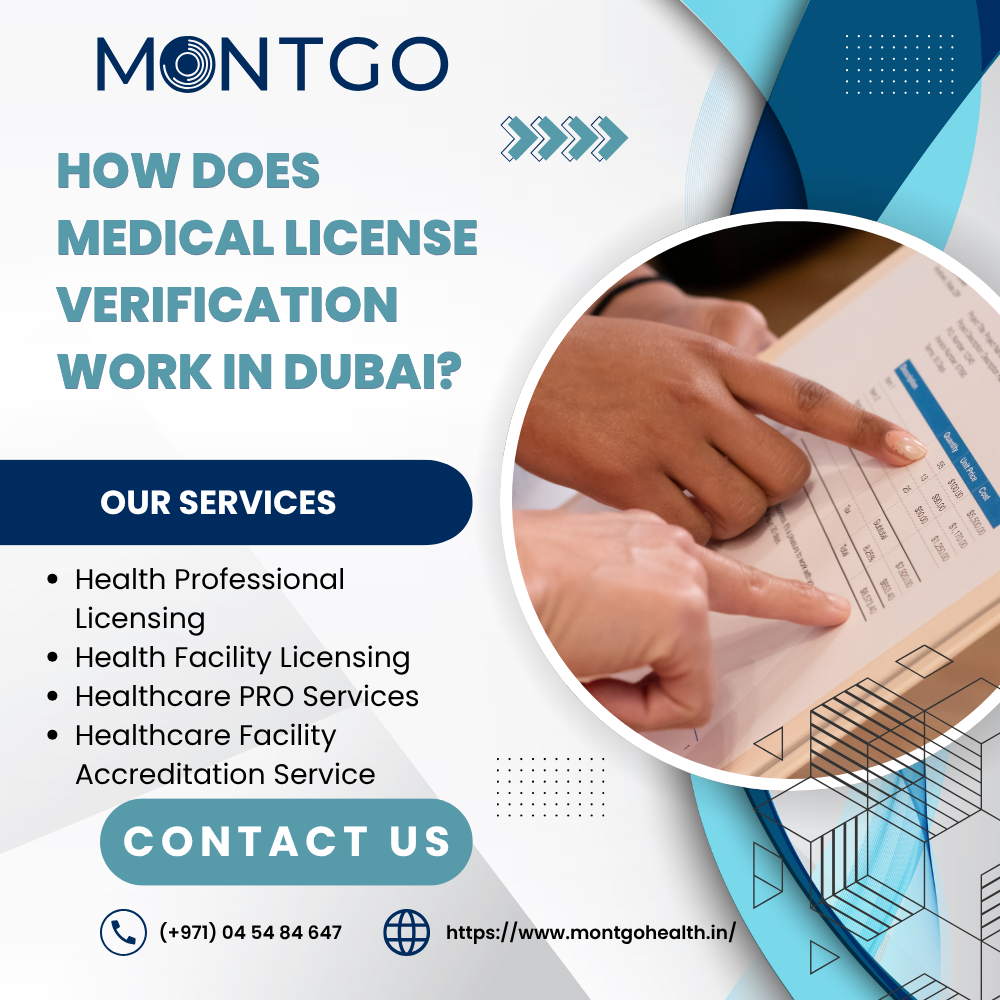Dubai is a global center for healthcare that draws doctors from all around the world.With its advanced medical infrastructure and high standards of care, the city maintains strict regulations to ensure that only qualified and competent professionals can practice. One essential process in maintaining these standards is medical license verification. But how exactly does it work? In this blog post, we’ll break down the steps involved in verifying a medical license in Dubai and what healthcare professionals need to know before applying.
Understanding the Regulatory Authorities
The Dubai Health Authority (DHA) is the main organization in charge of granting licenses to medical professions in Dubai. Other regions in the UAE have their own health authorities, such as:
- HAAD (Health Authority – Abu Dhabi) For Abu Dhabi
- MOHAP (Northern Emirates Ministry of Health and Prevention)
- DHCC (Dubai Healthcare City Authority) for professionals working within Dubai Healthcare City
Each authority operates its own licensing system, but in this blog, we’ll focus on DHA license verification, which is necessary for practicing medicine within Dubai city limits.
For Primary Source Verification (PSV), DataFlow’s Function
Before granting a license, the DHA conducts a Primary Source Verification (PSV) to ensure that all submitted credentials are genuine. This is done through a third-party service provider called DataFlow Group.
Here’s what gets verified:
- Educational qualifications (e.g., MBBS, MD, nursing degrees)
- Professional experience (employment history)
- Good standing certificates from previous medical councils
- License authenticity from other countries or emirates
This process ensures that the candidate is fully qualified, experienced, and ethically fit to practice.
Step-by-Step: How Medical License Verification Works
1. Create an Account on Sheryan
The first step is to create an account on Sheryan, DHA’s online portal. This platform is used for all licensing-related activities including application submission, document uploads, and fee payments.
2. Submit the Required Documents
Applicants need to submit scanned copies of:
- Passport and passport-sized photograph
- Educational certificates
- Clinical experience letters
- Professional license from home country
- Good standing certificate
- Recent CV
Every document needs to be either formally translated into English or in English.
3. Initiate the DataFlow Verification
Once documents are uploaded, the system redirects the applicant to the DataFlow portal. Here, the PSV process begins. This typically takes 30–45 working days depending on the country of origin and the complexity of verification.
DataFlow directly contacts universities, previous employers, and licensing authorities to verify the credentials. Any discrepancy or forgery can lead to disqualification or a ban.
4. Take the Prometric Exam (If Required)
Depending on the role and specialization, many applicants must pass the Prometric exam — a computer-based test that assesses professional knowledge. This is especially true for doctors, dentists, pharmacists, and nurses.
5. DHA Review and License Issuance
After successful PSV and exam clearance, the DHA reviews the complete application. The candidate obtains a professional license, which enables them to lawfully practice in Dubai, if all requirements are met.
Why Is License Verification So Strict?
Dubai’s healthcare system has a reputation for excellence, which is why the licensing process is meticulous. The goal is to:
- Ensure patient safety
- Maintain international medical standards
- Eliminate fraudulent practices
- Attract top talent
The rigorous verification protects both patients and institutions from unqualified practitioners.
Conclusion
Whether you’re a doctor, nurse, or allied health professional, obtaining a medical license in Dubai is a multi-step but achievable process. The key is to provide authentic and complete documentation and to be patient during the verification timeline.
For aspiring healthcare workers looking to build a career in Dubai, understanding the medical license verification process is the first step toward a rewarding future in one of the world’s fastest-growing healthcare markets. Contact Montgo Health
Fequently Ask Questions
Q. How to verify a medical license in India?
A. You can verify a medical license in India through the official website of the National Medical Commission (NMC) or respective State Medical Councils by entering the doctor’s registration number.
Q. In which countries is an Indian medical license valid?
A. An Indian medical license is not directly valid abroad. Countries like the UK, USA, Australia, UAE, and Canada require additional exams (e.g., PLAB, USMLE, AMC, Prometric) and licensing processes before practice.
Q. How to get a medical license in India?
A. To get a medical license in India, you must complete an MBBS degree from an NMC-recognized institution and pass the FMGE (for foreign graduates) or NEXT (for Indian graduates, upcoming) to register with a State Medical Council or the NMC.
Q. How can I get a medical certificate in India?
A. A medical certificate can be obtained from a registered medical practitioner (RMP) or government-authorized hospital after a proper health examination.
Q. Can employers verify a medical certificate in India?
A. Yes, employers can verify a medical certificate by contacting the issuing doctor or hospital directly or by checking with the appropriate State Medical Council if needed.
Q. Is an online medical certificate valid in India?
A. Online medical certificates are valid only if issued by a registered medical practitioner and follow telemedicine guidelines laid out by the Ministry of Health and Family Welfare. However, employers may still prefer physical copies.
